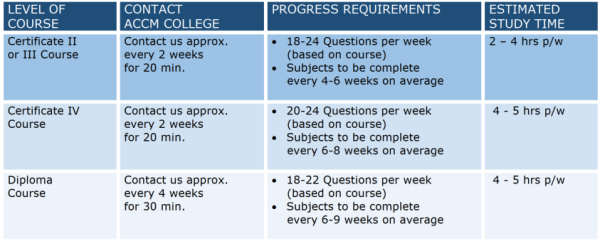Throughout your Subject, as you complete each Section, you will be demonstrating your competency by completing the assessment activities that we have designed for you.
These assessment activities generally takes place by way of multiple-choice questions, written answers, role plays or skills checks and practical examples to demonstrate the specific skills and knowledge required by the Units of Competency that make up your formal qualification.
You may suggest alternative methods of assessment if you believe they will still meet national standards.
Once these activities are complete, and you Submit your assessment, you will have entered the marking or “assessment” stage.
Please note, you may request for your Subject to be submitted earlier to check your progress. ACCM College may also submit for you to make sure you are on the right track and to help you keep progressing towards your goals.
Your Results
There are three possible results once we review your Assessment Tasks. They are:
Competent i.e. you have demonstrated knowledge of all of the criteria; or
Partially Assessed i.e. there is still some work left to complete or revise.
If you are advised that an Assessment Task is “Partially Assessed” you will also be able to click ‘Review’ in Webclass, so you can see the specific feedback on which question need to be reviewed and revised.
Then you can re-do or revise the required questions and resubmit them to us.
There is no limit on the number of times you can resubmit (and there is NO additional charge for resubmissions), our courses are a learning process, and so getting questions incorrect is not a problem!
You just review the feedback, and have another go! It’s all a part of the learning journey.
Quality Check:
ACCM College has a range of quality assurance processes in place.
This is not just a good business process, it is also a requirement of the National Standards that govern how Registered Training Organisations (RTO) operate.
Assessed subjects are added to our quality assurance process for a wide range of reasons (including random chance!).
This means there is nothing you have done wrong or need to do!
This is an internal Quality Assurance check that may involve one or more of the following:
-
ACCM management review of our internal assessment practices (meaning we want to make sure our Assessor's have done everything right)
-
Secondary review of your Training Record Book / Performance Evidence Record to confirm Vocational Competence (a critical part of a Vocational Qualification)
-
Contacting your Supervisor to discuss your on-the-job performance of the workplace skills required for this Subject (a key component of completing a Traineeship)
Upon completion of this Quality Assurance review, your Assessment results will be updated accordingly or you will be contacted if any additional information is needed.
Again, there is nothing to worry about and there is nothing else you need to do at this time, this is an important Quality Assurance step in the Vocational Training process.
Please note, it can take up to three weeks, during busy periods, to clear the process.
If there is a reason to expedite the process, reach out to us at contact@accm.edu.au for assistance.
If you are still concerned, please just reach out to your Student Adviser and they will do all they can to help.

